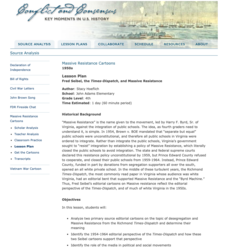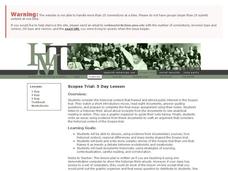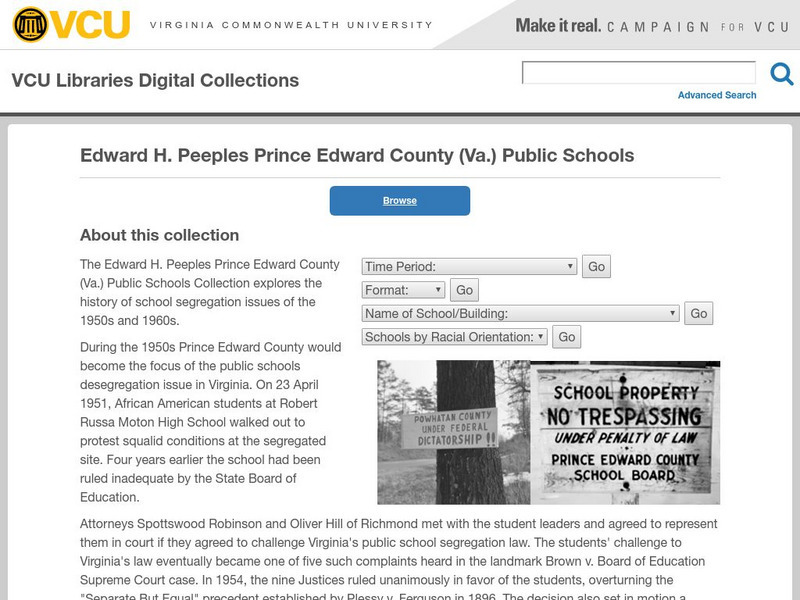Carolina K-12
Active Citizenship in After School
Active citizenship is the bedrock of any great democracy. Continue the trend by teaching the next generation about voting rights and the functions of elections in society. The variety of activities in the resource includes a human...
American Institute of Physics
Historical Detective: Edward Alexander Bouchet and the Washington-Du Bois Debate over African-American Education
Young scientists meet Edward Alexander Bouchet who, in 1876, was the first African American to receive a PhD in Physics. This two-part lesson first looks at the debate between Booker T. Washington and W.E.B. Du Bois about the type of...
DocsTeach
A Revolution, a Reaction and a Reform: Getting Ready for National History Day
Get ready for National History Day! A thought-provoking activity focuses on a hypothetical project for National History Day (NHD). Academics review three primary sources to determine if they would meet the criteria for a NHD project....
Center for History Education
Brown v. the Board of Education: Success or Failure?
Desegregation does not mean equality. An eye-opening lesson focuses on the impact of the Brown v. Board of Education decision to end school segregation. Scholars review a series of political cartoons to understand how the public viewed...
Smithsonian Institution
Re-Segregation of American Schools: Re-Segregation
Examine the re-segregation of public schools in a thought-provoking resource. Young scholars read articles and primary sources, complete worksheets, and watch a video to explore the idea that desegregation made schools more segregated....
Roy Rosenzweig Center for History and New Media
Fred Seibel, the Times-Dispatch, and Massive Resistance
A instructional activity challenges scholars to analyze editorial cartoons created by Fred Seibel, illustrator for the Times-Dispatch, during the Massive Resistance. A class discussion looking at today's editorial pages and Jim Crow...
Alabama Department of Archives and History
The Effect of the Great Depression on Children and Education
What was it like to be a kid growing up during the Great Depression? Academics study primary sources to analyze the effect of school closures on children during the Great Depression. They then participate in group discussions and writing...
ProCon
Standardized Tests
Does the use of standardized testing improve American education? Scholars dive into the issue as they prepare to discuss the debate topic with their classmates. After reviewing the pros and cons, they watch videos to help them arrive at...
Reed Novel Studies
Where The Red Fern Grows: Novel Study
Does hard work and determination really pay off? It seems that way for Billy, a character in Where The Red Fern Grows. After working for two years, he finally has enough money to buy the pups he's always wanted. Scholars read about the...
Daughters of the American Revolution
Lesson 1: How Do Society’s Expectations Influence Education?
The history of women's education can be traced back to the delicate stitching of student samplers from the 19th century. Modern-day pupils examine and analyze four primary sources, three of which are images of embroidered samplers, which...
Elizabeth Murray Project
The Education of Women in Colonial America
What educational opportunities were available to women during the colonial era in American history? How did the opportunities available to women differ from those for men? To answer this question, class members examine a series of...
Historical Thinking Matters
Scopes Trial: 5 Day Lesson
Did Scopes violate the Butler Act? Why did so many Americans follow the Scopes trial? See analytical reading in action with a fantastic five-day lesson plan in which class members consider the historical context that provoked public...
Curated OER
Early American Education and Horace Mann
Students analyze the contributions of Horace Mann. In this public education lesson, students research Internet and print sources regarding the history of American education, Mann.s life, the Morrill Act of 1862, and the Northwest Ordinance.
Curated OER
Back to School
Students investigate the many ways of learning and examine classroom instructional techniques. They research the history of American Public Education.
Curated OER
Japanese Culture--Comparing the Japanese Educational System to the American
Students study the Japanese educational system and compare and contrast it to the American system. They discuss a typical school day in America and what they believe a typical day is for a Japanese student. Next they write an editorial...
Virginia Commonwealth University
Virginia Commonwealth University: Separate but Not Equal
Telling pictures of elementary schools for Blacks and Whites during the 50s and 60s. Discusses the situation in Prince Edward County that led to the Davis v. County School Board of Prince Edward County court case.
University of Notre Dame
University of Notre Dame: History of American Education
This site from the University of Notre Dame contains great information on the History of American Education. This particular page is maintained by one of the professors at the college and contains links to information on the subject.


















